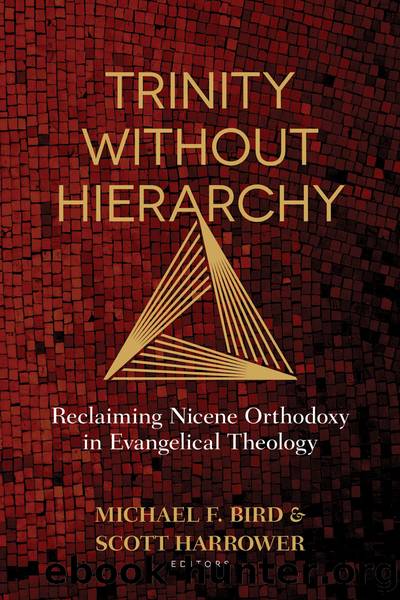Trinity Without Hierarchy by Michael F. Bird

Author:Michael F. Bird
Language: eng
Format: epub
Publisher: Kregel, Incorporated
Published: 2019-06-15T00:00:00+00:00
A. Covenants, Covenantal Relation, and the Covenant of Redemption
For the most part, seventeenth-century moral debates regarding the nature of contractual agreements were developed in reference to the concept of natural law. That is because the rights and obligations which arise from any voluntary agreement are guaranteed by more fundamental moral principles inscribed upon the law of nature by our Creator. Nature logically precedes act. So, voluntary agreements can formalize a new kind of relation between covenanting parties, in which the agreed rights and obligations of the covenant accrue to each party by virtue of their voluntary participation in the covenant. But since any covenantal relation is voluntary in character, it must ultimately supervene upon those relations (along with their attending rights and obligations) that the covenanting parties maintain by the law of nature. It was therefore the operative presupposition that any account of the proper nature of a covenant must be consonant with (or at the very least, not contradictory to) the wider dictates of the law of nature. Indeed, where a covenant explicitly stands in contradiction to the order of nature, there cannot be a covenant. As we will see below, this point will be relevant for our understanding of the pactum salutis and the mission of the Son.
With respect to the general nature of a covenant, Owen argues that a covenant is âcompleteâ or âequal,â that is, a legitimate and true covenant, if it meets the conditions below. Owen justifies some of these conditions biblically, but it would be a mistake to assume that the necessity of these claims is primarily exegetical. The biblical justifications here are relatively thin and, in any event, these conditions were fairly common tropes in seventeenth-century philosophical and legal texts treating the nature of contracts. As such, their necessity is likely as much indebted to local convention and wider forms of moral reasoning as it is to any strictly biblical consideration. Of course, Owen does not take these to be mutually exclusive, eitherâindeed, to his mind, the moral universe forms the broader context of the biblical narrative, and so he expects the two to be mutually reinforcing. Nevertheless, it is worth remembering that the following conditions are supported and informed by a wider network of biblical, theological, and moral judgments. They are as follows:
(1)A covenant must be between distinct persons. Owen bases this judgment, formally at least, on Galatians 3:20, which claims that âa mediator is not of one,â and so suggests that there must be diverse parties between which Christ mediates. The implicit assumption is that, as Christ acted on behalf of his people in the formalising of the covenant, the covenant of redemption must be between distinct parties.24
(2)It must be a voluntary agreement. Owenâs stated reason for this is that the biblical term for covenant (berith) derives from a root meaning âto choose.â Accordingly, a proper covenant is one in which both parties enter freely into an agreement, without coercion and unconstrained, but with a âdue consideration and right judgmentâ of its terms.
Download
This site does not store any files on its server. We only index and link to content provided by other sites. Please contact the content providers to delete copyright contents if any and email us, we'll remove relevant links or contents immediately.
Christian Ethics by Wilkens Steve;(860)
Christian Ethics for a Digital Society by Kate Ott(779)
Fearfully and Wonderfully Made by Philip Yancey & Paul Brand(771)
God and the Multiverse by Victor J. Stenger(675)
Numbers by Ronald B. Allen(639)
How to Read Slowly by James W. Sire(616)
Christian Ethics: An Introduction to Biblical Moral Reasoning by Wayne Grudem(598)
The City of God by Saint Augustine & Marcus Dods(590)
Monastic Archaeology by Unknown(568)
Morality by Jonathan Sacks(566)
The Technological System by Jacques Ellul(549)
Amish Grace by Donald B. Kraybill & Nolt Steven M. & Weaver-Zercher David L(535)
Death of the Doctor by Unknown(526)
The Disabled Church by Rebecca F. Spurrier;(523)
Jesus: A New Vision by Whitley Strieber(522)
Children of Lucifer; The Origins of Modern Religious Satanism by Ruben van Luijk(513)
Critical Writings by Joyce James;(503)
Redeeming Sociology by Vern S. Poythress(488)
The Church in the Early Middle Ages by G.R. Evans(477)
